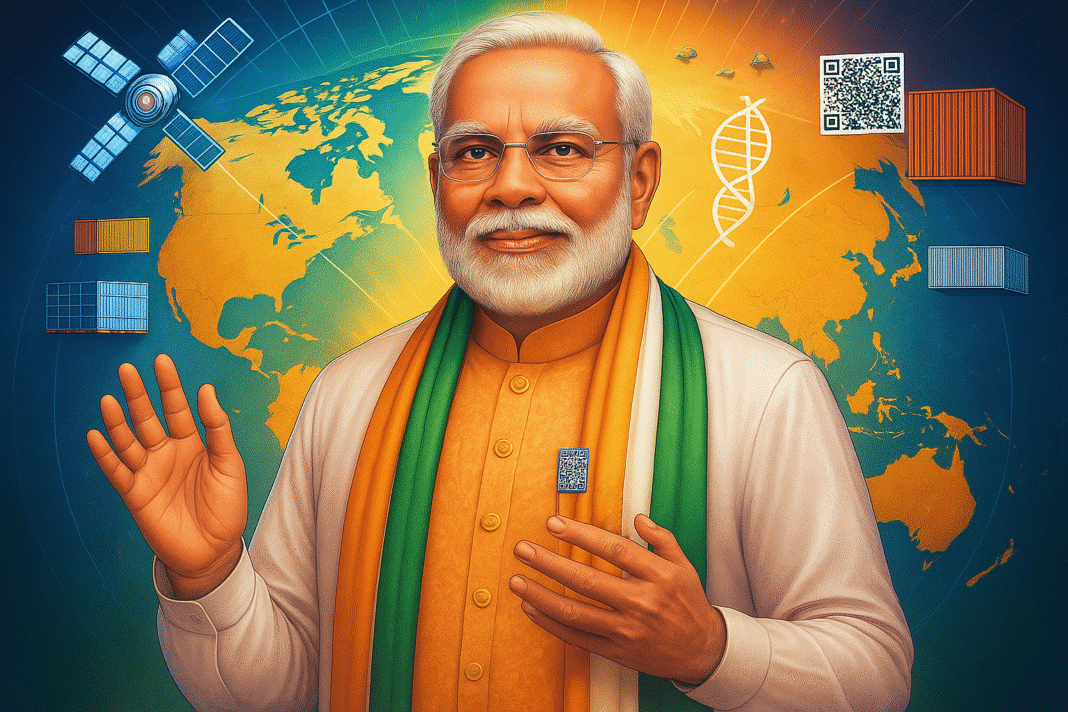Prime Minister Narendra Modi’s five-nation diplomatic tour in July 2025 was far more than a series of ceremonial meetings. It represented a transformative effort to reorient India’s global partnerships towards strategic sectors like trade, energy, digital infrastructure and resource security. The countries visited—Namibia, Brazil, Trinidad & Tobago, Ghana and Argentina—were carefully selected to strengthen India’s standing across the Global South and to unlock real, measurable benefits. Here’s a comprehensive look at the strategic gains and real-world advantages accruing to India from these landmark engagements.
1. Expanding Trade and Opening New Markets
Bilateral Trade Growth with Brazil
India and Brazil committed to doubling their bilateral trade to $20 billion over the next five years. This agreement will especially benefit India’s export sectors like pharmaceuticals, engineering goods, textiles, IT services and agri-products. In return, India gains broader access to Brazil’s large-scale agricultural output, iron ore and other raw materials essential for Indian industries.
Strengthening India-MERCOSUR Ties
India is working with Brazil to expand the Preferential Trade Agreement with the MERCOSUR bloc (Brazil, Argentina, Uruguay, Paraguay). The deal is expected to ease tariffs on Indian exports and facilitate greater regional market penetration for Indian companies.
Tapping Resource-Rich Argentina and Namibia
Argentina’s rich lithium and copper reserves, essential for electric vehicles and renewable energy systems, are now more accessible to Indian industries through new direct sourcing agreements. Likewise, Namibia’s vast deposits of diamonds, cobalt, and lithium are being tapped through bilateral mineral partnerships. These deals will that have come in place in presence of PM Narendra Modi will help reduce India’s dependence on China and other traditional mineral suppliers.
2. Digital Transformation and Globalization of UPI
UPI Goes Global
Namibia and Trinidad & Tobago have adopted India’s Unified Payments Interface (UPI), making them the first adopters in Africa and the Caribbean respectively. The expansion of UPI is not just a diplomatic win but a business victory, opening doors for Indian fintech companies to build services and infrastructure abroad.
Exporting India’s Digital Infrastructure
India signed MoUs with Brazil, Namibia and Trinidad & Tobago to deploy its Digital Public Infrastructure (DPI), including tools like DigiLocker, e-Sign and health-tech platforms. This enhances India’s soft power and builds a global market for Indian tech startups and IT service providers.
AI and Supercomputing with Brazil
A new joint framework on artificial intelligence and supercomputing between India and Brazil will lead to shared innovation and cross-border technology development. This is a leap forward for Indian R&D, with spillover benefits for startups and academia.
3. Clean Energy and Resource Security
Global Biofuels Alliance Expansion
Brazil and Namibia joined the Global Biofuels Alliance, co-led by India. This strong partnership strengthens India’s access to biofuels and bio-refinery technology, supporting its net-zero goals and reducing reliance on imported fossil fuels due to much advance intervention of PM Narendra Modi, considering future growth in this sector also.
Critical Mineral Security
India’s direct sourcing agreements with Argentina and Namibia cover key minerals like lithium, cobalt, and graphite—essential for battery storage, solar panels and electric vehicles. This ensures India has a stable and diversified supply chain for its energy transition.
Renewable Energy Projects Abroad
India extended support for rooftop solar projects in Trinidad & Tobago and Ghana, demonstrating its growing role as a clean energy exporter. PM Narendra Modi has make sure that Indian solar companies will benefit from these engagements by accessing new international markets.
4. Boosting Pharmaceutical and Healthcare Exports
Direct Procurement of Medicines
Namibia and Trinidad & Tobago have agreed to procure medicines directly from Indian pharmaceutical firms. This bypasses intermediaries and strengthens the supply chain for life-saving drugs from India to the Global South.
Exporting Healthcare Infrastructure
India supplied haemodialysis machines and sea ambulances to partner countries and conducted prosthetic limb camps in Trinidad & Tobago. These initiatives demonstrate India’s capability in exporting medical devices and humanitarian healthcare services.
Digital Health Diplomacy
India’s Ayushman Bharat model and digital health stack are gaining interest abroad. As countries like Namibia and Trinidad adopt these systems, India stands to gain significant health-tech market opportunities under guidance of PM Narendra Modi.
5. Agricultural Cooperation and Food Security
Sharing Millets and Natural Farming
Under the leadership if PM Narendra Modi, India is promoting millets, natural farming and drone-assisted agriculture across its partner countries. This enables Indian agri-tech firms to showcase innovations while addressing food security challenges in developing nations.
Exporting Agro-Processing Machinery
India exported $1 million worth of agro-machinery to Trinidad & Tobago. These exports support rural Indian manufacturing clusters and MSMEs specializing in agri-tech solutions.
6. Defense and Strategic Security Collaborations
New Security Partnerships
India signed defense and cybersecurity agreements with Brazil and Namibia. These initiatives include joint training programs, counter-terrorism exercises and defense technology exchanges, opening avenues for India’s defense exports.
Strategic Industrial Cooperation
India is exploring co-production in semiconductors, pharmaceuticals and aerospace sectors with these countries. These agreements help build strategic industrial partnerships and improve technology transfer while boosting Make-in-India initiatives envisioned by PM Narendra Modi.
7. Capacity Building and Human Resource Development
Knowledge Exports
India donated 2,000 laptops to schools in Trinidad & Tobago and increased scholarships and ITEC training slots for students and professionals. This enhances India’s role as a knowledge exporter and raises its soft power.
Academic and Diplomatic Training
New MoUs allow Indian institutions to provide specialized courses in public administration, diplomacy and science to partner countries. This helps Indian universities and think tanks expand their global footprint.
8. Securing Supply Chains in a Fragmented World
India’s partnerships with Argentina, Namibia and Bolivia focus on building secure and resilient supply chains for critical minerals and advanced technologies. PM Narendra Modi insures that in a geopolitically tense world, this proactive strategy reduces India’s vulnerability to global shocks and supply disruptions.
9. India’s Enhanced Standing in Global Forums
BRICS and Global Governance
India’s active role in the BRICS Summit and advocacy for reforms in multilateral institutions signal its ambition to shape global economic governance. These efforts help ensure better representation of developing nations and position Indian companies more favorably on the global stage.
Global South Leadership
PM Narendra Modi had actively engaged with Latin America, Africa and the Caribbean, India is reinforcing its leadership in the Global South. This translates into diplomatic goodwill, stronger voting blocs in multilateral forums and expanded economic influence.
Strategic Leap for India through strong leadership of PM Narendra Modi
PM Narendra Modi’s 2025 visits to Namibia, Brazil, Trinidad & Tobago, Ghana and Argentina were deeply strategic and results-oriented. They unlocked doors to critical resources, technology transfers, defense cooperation and new markets. The adoption of UPI in new regions, direct mineral sourcing deals, export of digital and healthcare solutions and India’s leadership in clean energy and global governance are not just headlines—they are building blocks of India’s ambition to be a global economic powerhouse.
These engagements are reshaping how India is viewed on the global stage—not as a peripheral player, but as a central force driving technology, diplomacy and development in the 21st century under PM Narendra Modi’s leadership.




